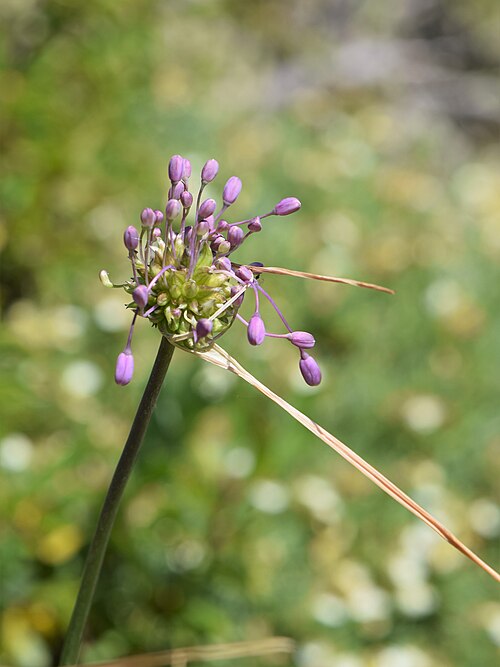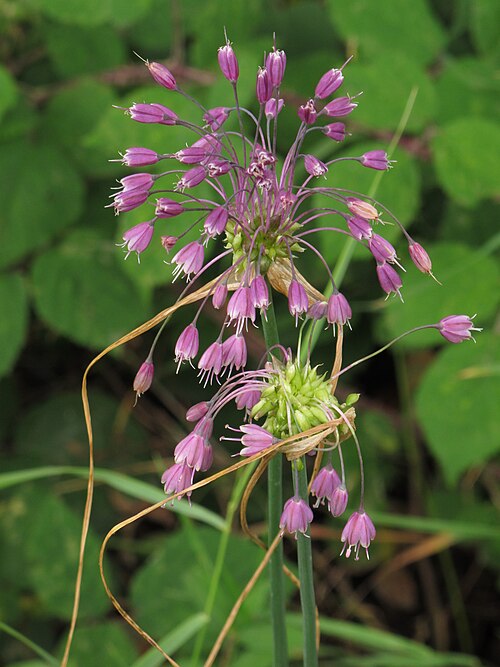Allium carinatum: A Delicate European Onion for Your Garden
Meet Allium carinatum, a charming little member of the onion family that’s been quietly winning over gardeners with its understated elegance. While it might not have the flashy reputation of its showier cousins, this petite bulb brings its own special brand of beauty to the garden landscape.
What Makes Allium carinatum Special?
This delicate European native produces clusters of small, purple-pink flowers that dance atop slender stems in summer. The blooms form loose, airy umbels that have a wonderfully informal, almost wild appearance. The narrow, grass-like foliage adds texture without overwhelming other plants, making it a perfect supporting player in garden compositions.
Where Does It Come From?
Allium carinatum calls Europe home, particularly thriving in Mediterranean regions and parts of central and southern Europe. It’s adapted to the rocky, well-draining soils and sunny conditions typical of these areas, which gives us great clues about how to grow it successfully in our own gardens.
Garden Design Ideas
This versatile little bulb shines in several garden settings:
- Rock gardens where its delicate flowers can peek through stones
- Mediterranean-style plantings alongside lavender and rosemary
- Naturalized areas where it can spread and create drifts
- Front borders where its modest height won’t block other plants
- Dry gardens that celebrate drought-tolerant beauty
Growing Conditions and Care
The good news is that Allium carinatum is refreshingly low-maintenance once you understand its preferences:
Hardiness: Thrives in USDA zones 4-8, handling both cold winters and warm summers with grace.
Sun and Soil: Loves full sun to partial shade and absolutely must have well-draining soil. Think Mediterranean hillside rather than English cottage garden when it comes to moisture levels.
Water Needs: Once established, this tough little bulb is quite drought tolerant. Overwatering is more likely to cause problems than underwatering.
Planting and Care Tips
Getting started with Allium carinatum is straightforward:
- Plant bulbs in fall, about 2-3 inches deep and 3-4 inches apart
- Choose a spot with excellent drainage – soggy soil is this plant’s enemy
- Water during the growing season but allow soil to dry between waterings
- Let the foliage die back naturally after flowering to feed the bulb for next year
- Minimal fertilization needed – these bulbs prefer lean conditions
Wildlife and Pollinator Benefits
Don’t let its modest size fool you – Allium carinatum is a pollinator magnet. Bees, butterflies, and other beneficial insects flock to its nectar-rich flowers. The extended blooming period provides a reliable food source during the summer months when many spring flowers have finished.
Should You Plant It?
If you’re gardening in North America, Allium carinatum can be a lovely addition to your garden, particularly if you’re creating Mediterranean-style plantings or rock gardens. However, consider exploring native allium species first, as they’ll provide similar beauty while supporting your local ecosystem more directly.
For European gardeners, this native gem is definitely worth considering, especially if you want to support local biodiversity while adding subtle charm to your landscape.
The Bottom Line
Allium carinatum may not be the loudest voice in the garden choir, but it’s definitely worth a listen. Its delicate beauty, easy care requirements, and pollinator appeal make it a thoughtful choice for gardeners who appreciate understated elegance. Just remember: good drainage is key, and sometimes the most beautiful gardens are those that celebrate subtle rather than showy.







